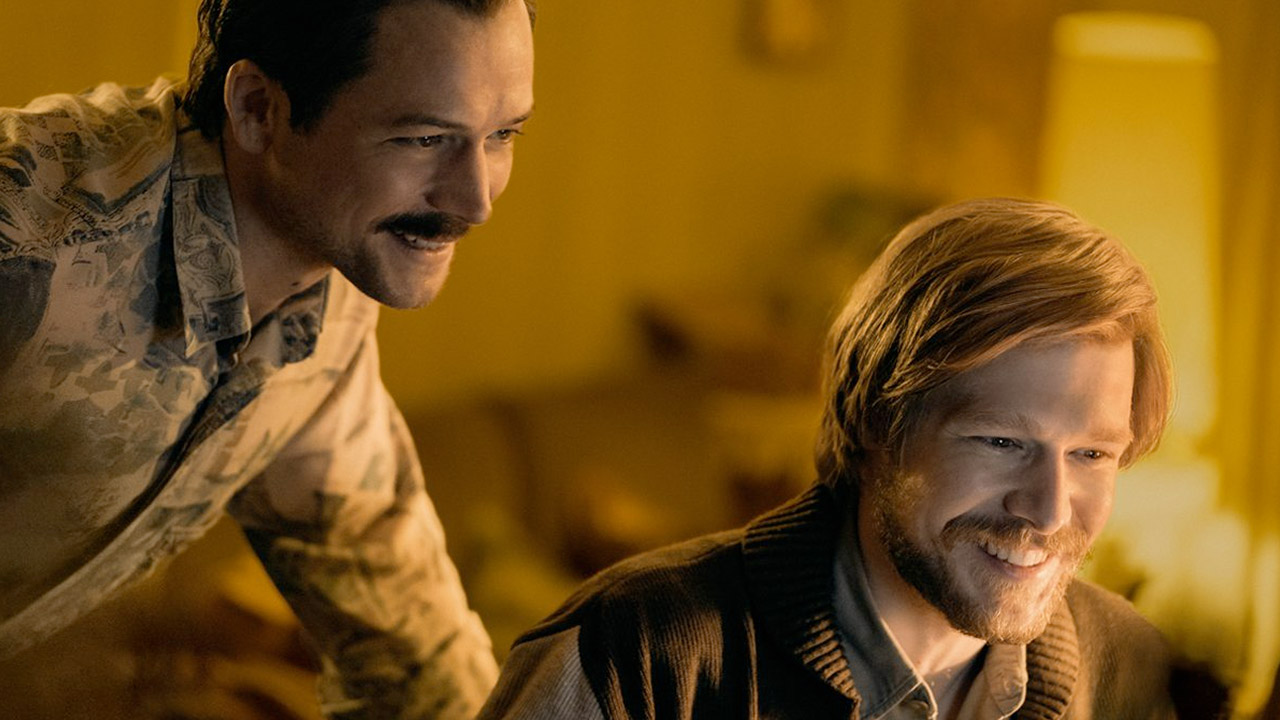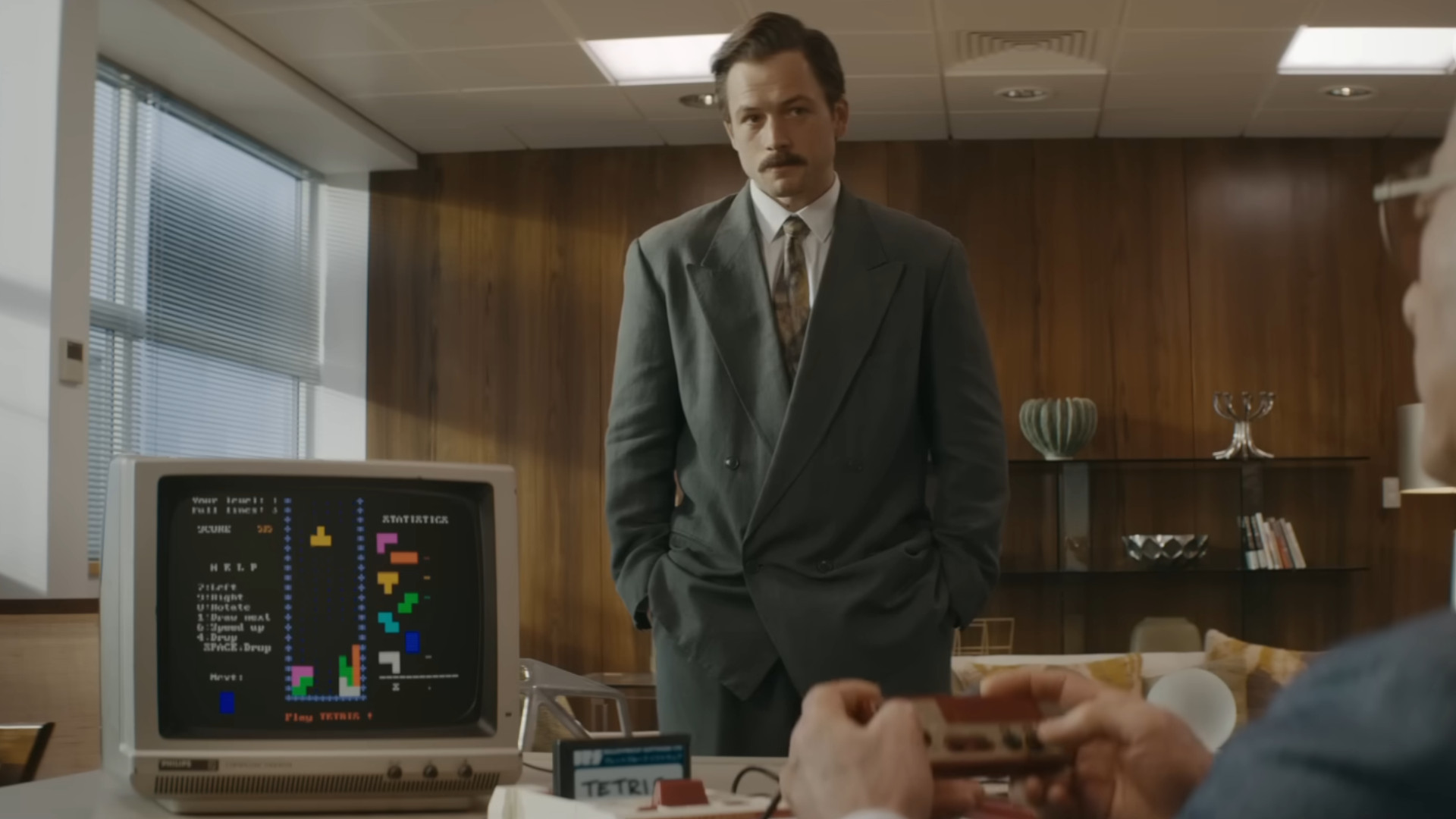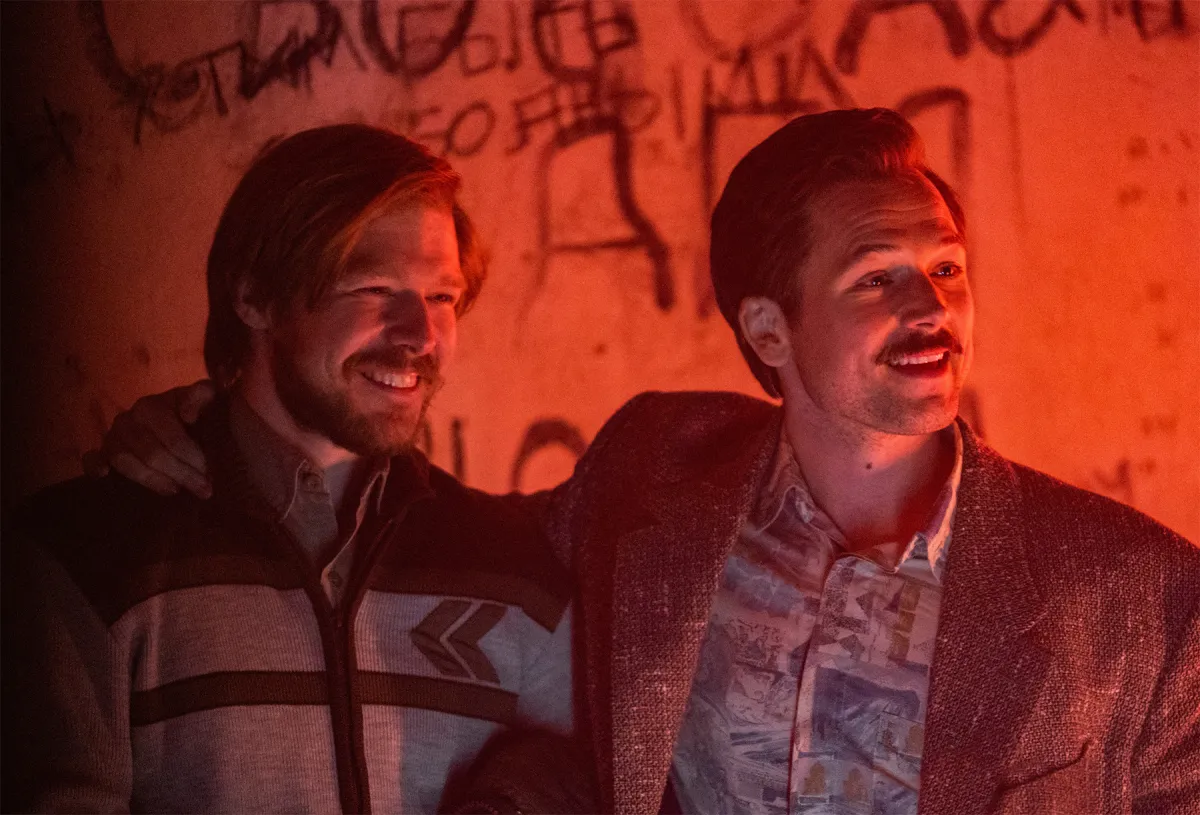You’ve played Tetris, right? Maybe in an arcade, or at a friend’s house, on your phone, or maybe on a Game Boy when you were a kid? It’s one of the most popular video games of all time. The origin story of the game – and how the game came to be so popular – is far more interesting than most would assume. Tetris, starring Taron Egerton and premiering on Apple TV+ today, tells the tale.
Retro gaming has risen in popularity over the last few years, and with that comes retro video game conventions. Personally, I don’t play very many retro video games, but I love to attend retro video gaming conventions when I can. It’s always fun to see the old designs and hear the music. The popularity of retro gaming makes this the perfect time to release a movie about Tetris. The beginning of Tetris takes place at an actual retro video game convention — in 1988, at a Las Vegas gaming showcase.
I went to write this article and discovered that you can play Tetris online for free, any time. It’s probably a good thing that I went this long in life without this information because wow, did I just waste 45 minutes in the blink of an eye. That’s how it goes when you start playing Tetris, and that’s exactly what drew Henk Rogers to the game when he “discovered” Tetris at a games showcase. He’d been trying to sell his game, a version of Go, without much luck, and he fell in love with Tetris. At least, that’s how Tetris the movie begins the story.
Taron Egerton stars as Henk Rogers, the man who is credited with bringing Tetris out of the Soviet Union and into the rest of the world. When trying to sell the idea of Tetris to his investor, Larry (Rick Yune), Henk tells him, “I played Tetris for five minutes and still see falling blocks in my dreams.” It’s a pretty apt description of what it’s like to be into Tetris, I think, and a pretty good sell. At this point, Tetris is already popular in Russia, and Henk wants to bring it to the rest of the world. He’s ready to travel to the Soviet Union — which wasn’t really done at the time — to secure the distribution rights to the game.

If you haven’t been watching Egerton’s career, you should know he’s as talented as they come. From his beginning with the Kingsman movies, he consistently delivers impressive performances. He’s played a number of real-life characters — Elton John in Rocketman, Jimmy Keene in Black Bird, and Eddie the Eagle. Egerton gives the sort of performances where you really forget that there’s an act taking place, where he fully embodies the character.
It’s interesting that this film, set in Soviet-era Russia, is coming out at a time when tensions are so high in American politics, and “communism” is treated like a dirty word. In the interest of maintaining my own sanity and respecting my time, I’m going to refrain from any sort of deep dive into the politics of the time, or currently. Suffice it to say that 1988, when Tetris begins, was a particularly turbulent year for the Soviet Union and Mikhail Gorbachev. The original script for Tetris was titled “Falling Blocs” — the story of Tetris can’t be told without at least mention of the politics between the USSR and the rest of the world.
There’s plenty of anti-communist and/or pro-capitalist propaganda in film, and is it really any surprise that Tetris takes an anti-communist spin? It might not be outright nationalist like a certain popular cinematic universe, but to say that Tetris merely hints at anti-communist thought is like saying that Fox News is a completely neutral news source. And Tetris premiered at this year’s SXSW — one of the the US’s largest festivals that the government has its hand in.

So, I’d like to gently suggest keeping this in mind when watching Tetris — or really any film that takes place in a communist or socialist region. Who’s making the film, who’s backing the film, what’s the production company, and who are their shareholders? It’s worth giving this some thought whenever you see a film or game where the Middle East is all sepia-toned, where Mexico and South America are yellow-hued and grimy, or where Eastern Europe is extremely desaturated and practically every shot features brutalist architecture. As we surely all expect from American media depicting fascist or war-torn countries, the Russia of Tetris is particularly neutral in palette. Drab grays and olive greens barely contrast with the muted red of Lenin’s banner. As Henk Rogers travels all over the globe, Tetris relies heavily on these filters to make it very clear where he is.
Underneath this thinly sheathed anti-communist perspective is a hint of anti-capitalism too. The British capitalists are also playing the roles of bad guys. There’s a fairly simplistic black-and-white point of view in this story, where the Russian “bad guys” are almost cartoonishly evil. To counter this, Henk Rogers and Alexey Pajitnov, the actual inventor of Tetris (played by Nikita Efremov), are the good guys. Having all these different players, though, means that there’s a great ensemble cast. Toby Jones and Roger Allan play the British bad guys, and Ben Miles makes an appearance as one of Henk’s few supporters, Nintendo chairman Howard Lincoln. Togo Igawa plays Hiroshi Yamauchi, head of Nintendo, and the scenes with him — and all of the scenes that take place at the Nintendo headquarters — will be fun for long-time Nintendo fans to watch.
As Henk finds himself completely in over his head and under the watchful eyes of the KGB, Tetris is definitely an embellishment of the true story that it’s based on, but some aspects are legitimate. Multiple companies thought they owned the rights to Tetris, and the Russian government wanted control over the sale — it got incredibly complicated, and the film does a good job of making the complex sale fairly succinct. Was Henk’s family really threatened by the KGB over this deal, and was he really told (multiple times) to go home? I’m not certain, but it makes for a great corporate espionage story, with more than a hint of political intrigue.

Even though lives and safety were endangered both in the true story and in the fictionalized film version, Tetris has a less serious tone about it than most crime thrillers do. Part of Tetris’s sense of humor comes from the 1980s aesthetics, which go beyond great costuming. Alexey Pajitnov’s geeky dad sweaters and Henk’s suits are so on point, but it all looks a little bit goofy when compared to modern fashion. Tetris also uses 8-bit avatars to introduce characters and locations, as well as retro, pixelated animation for title cards between acts. The soundtrack uses the Tetris theme in many different iterations and paces. This aesthetic and tone keeps the film amusing, and there are plenty of twists, turns, and a really great car chase scene — but by the 90-minute mark Tetris begins to feel like it runs a bit long.
It’s seemingly always a good time to make new Tetris games. Tetris 99 had a hold on me for a while, and then Tetris Effect. And Tetris Effect in VR. And now Tetris Effect Connected. It’s a lot, and it’s one game that I’ve actually never gotten sick of. Need to turn my brain off after a rough day? Need to absolutely zone out in a meeting but still be able to pretend I’m listening? Tetris. I haven’t played that many VR games, but Tetris Effect in VR might just be my personal favorite. I’m not even particularly good at Tetris, but I’ve loved it since I was a kid.
While Tetris the game will be evergreen, Tetris the movie seems to have found just the right time to drop into the fold. It’s an enjoyable thriller that’s certainly worth watching for Nintendo and retro gaming fans, and it’s a really fun movie in general. The political story is interesting and may be fairly surprising if you’re unfamiliar with the political background or with how game licensing works. Setting aside any particular political bias that the film might take, it’s entertaining. Between this and Ted Lasso, maybe you should get that Apple TV+ subscription.






Published: Mar 31, 2023 10:00 am